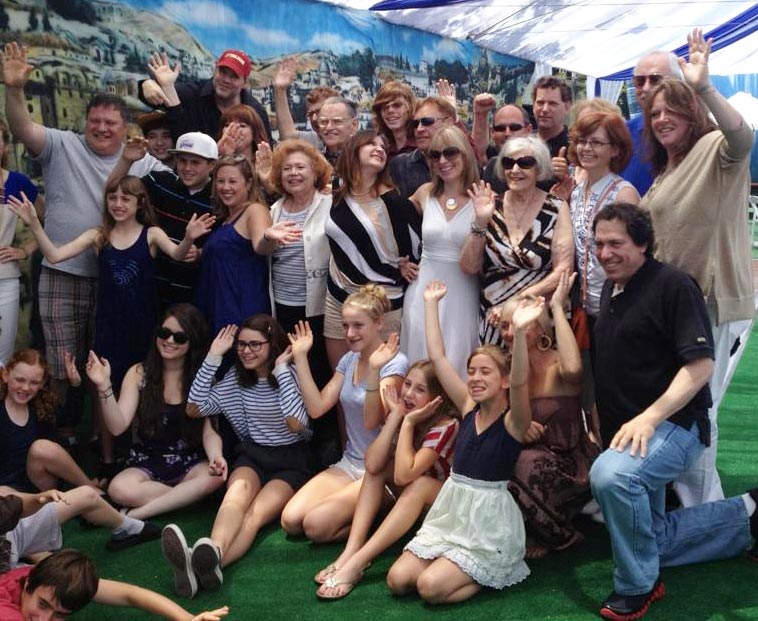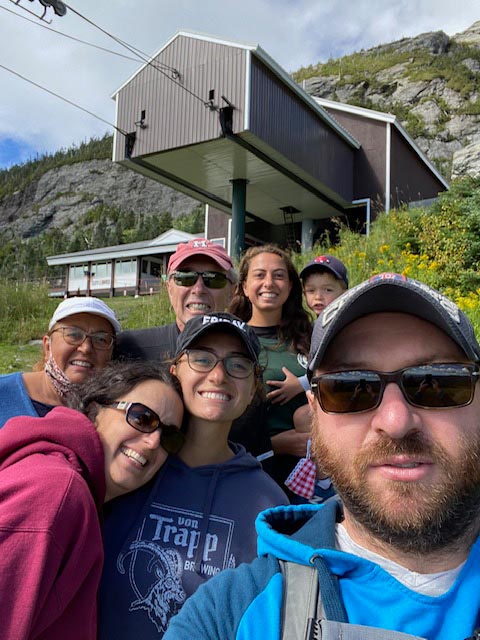Testimony of Espionage, Scheming, and Survival Reunites and Expands a Family

Above: One branch of the Scheinman family, which expanded considerably after cousin Zoe found and reached out to descendants of the ten children of Shmuel and Feige Scheinman, her husband’s great grandparents.
Last summer, Phil Scheinman spent five hours straight watching Joseph André Scheinmann’s testimony on USC Shoah Foundation’s Visual History Archive. He was both devastated and riveted.
André, who died in 2001, was his father’s first cousin. Phil never knew André, and never realized he had close relatives who had survived the Holocaust. But just as stunning as the discovery of this branch of the family was André’s story itself.
With his Jewish identity hidden, André had run a French resistance network of 300 spies who tracked German transport of goods and manpower across France and Germany and fed that information to British intelligence. André was arrested in 1942 and sent to prison and then to a concentration camp in France, where he was a translator and then a kapo, a prisoner appointed as overseer of other inmates. Still under an assumed identity, André saved dozens, maybe hundreds, of lives with his scheming and manipulation of the camp system. (Read André’s full story here)
Phil, a Las Vegas realtor and USC alumnus, knew he needed to share André’s testimony with his extended family, which had been meeting biweekly for a Covid-era Zoom happy hour he moderated. He spent months editing the interview into four 20-minute episodes with James Bond-type music, archival photos, maps, and excerpts from André’s unpublished memoir. For the first episode, about 40 family members watched. By the last episode, 400 ancestral Scheinmans (some spell it Scheinmann) tuned in, and André’s son, Michel, was on hand to answer questions.
“My father was a modest man, and unless he started talking about his wartime experiences, you would have no idea,” said Michel, a Boston consultant who was already in touch with some, but not all, of the Scheinmans he has met in recent months. “Now all of a sudden the whole family knows his story, and it’s just jaw-dropping.”
Zoe Scheinman, who is married to Phil’s first cousin and is a regular on his family Zooms, came across André’s USC Shoah Foundation testimony, recorded in Florida in 1997, when she was filling in the family tree on Ancestry.com.
In September 2020, USC Shoah Foundation launched partnerships with Ancestry.com and JewishGen.com, so that names listed in the Visual History Archive would be included in search results. Now genealogy sleuths like Zoe can easily access information about more than 50,000 Holocaust survivors who recorded testimony, and more than 600,000 people named in the indexed, searchable films. Family members can request free links to those recordings through USC Shoah Foundation.
Finding André was a breakthrough moment for Zoe, a literacy volunteer who lives in San Francisco. Using André’s testimony, the USC Shoah Foundation testimony of another cousin, and information she learned from Diana Mara Henry, a researcher and writer who worked with André on his memoir, Zoe was able to obtain more information about the ten children of her husband’s great grandparents, Shmuel (Sam) and Feige (Fannie) Scheinman.
Shmuel, Feige, and eight of their children left Europe for Palestine or the U.S. in the decades before the Holocaust. Another son, Nuchum, survived the war in the USSR. André’s parents, Max (Mendl) and his wife Regina, stayed in northern France to run their shoe business, and their daughter moved to America and married a cousin in 1939.
 Front row is my daughter-in law Michelle, my daughter Clara and my son Gabriel. Back row: my wife Brigitte, me, my daughter Emma and my grandson Jacob.
Front row is my daughter-in law Michelle, my daughter Clara and my son Gabriel. Back row: my wife Brigitte, me, my daughter Emma and my grandson Jacob. André was drafted into the French army, then worked in the French resistance until he was arrested in 1942. He endured solitary confinement and brutal interrogations for 17 months in Fresnes prison near Paris, and then spent more than a year doing forced labor in the Natzweiler-Struthof concentration camp in northern France. He was deported to Dachau in 1944 and liberated in April 1945. (Read more about André here)
When André reunited with his aunt and uncle in Paris, he learned that his parents had been sent to Auschwitz and killed in 1942. At his aunt and uncle’s home, he met Claire Dyment, a German Jewish linguist who had worked for the British Royal Air Force intercepting and decoding German radio messages.
The two got married in 1946 and in 1952 moved to the U.S. André ran successful businesses in Massachusetts and spoke often at schools and organizations about his experiences until he died in 2001.
“I am realizing every single day the incredible legacy of heroism and resilience that I have inherited, and with that comes this responsibility we have to be active members of society,” said André’s granddaughter, Clara Scheinmann, who works in nonprofits in Boston.
André’s son, Michel, said connecting with his family has reenergized his effort to publish his father’s memoirs.
Zoe has entered more than 1,000 relatives, living and deceased, on the family tree. Most of the family made it out, but seven relatives, including André’s parents, perished in the Holocaust.
This year, for the first time, the much-expanded family read those names in an online commemoration for Yom HaShoah.
“Before this I didn’t even know I had Holocaust survivors in my family,” Phil said. “It feels good to say their names.”